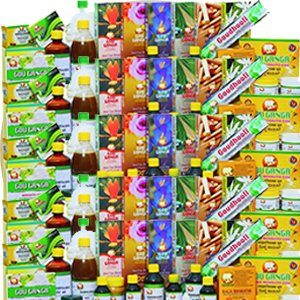What is A 1 and A 2 milk?
Milk that contains A1 beta casein is termed as A1 milk (produced by cross breeds & exotic breeds) and milk containing A2 beta casein is termed as A2 milk (Produced by Indigenous cows or Desi cows). There are various studies reporting consumption of A2 milk is safe, nutritious and beneficial to human health. About A1 and A2 beta-casein content in milk is elaborately explained in the book Devil in the Milk by Keith Woodford.
Composition of milk
Milk is composed of about 85% water. The remaining 15% is the milk sugar lactose, protein, fat, and minerals. The protein portion is 80% casein and 20% whey. Beta-casein is 30% of the total protein content in the milk.
All proteins are made up of long chains of amino acids. Beta casein is a chain of 209 amino acids. Due to various reasons mutations occurred and the gene encoding beta-casein was mutated and changed. The mutations took place in such a way that the 67th amino acid in the 209 amino acid chain (beta-casein protein) was switched from Proline to Histidine. This new kind of beta-casein that was created is known as A1 beta-casein.
The cause for concern with milk containing A1 beta-casein is that the 67th amino acid switch from proline to histidine readily allows a digestive enzyme to cut out a 7 amino acid segment of the protein immediately adjacent to that histidine. When proline is present in that location (as it is in A2 beta-casein), that same segment is either not separated at all or the separation occurs at a very low rate. The 7 amino acid segment that is separated from A1 beta casein is known as beta-casomorphin-7, often abbreviated as BCM-7.
BCM-7 is the real “devil” in A1 milk for a number of reasons. It is an exogenous (doesn’t naturally occur within the human body) opioid that interacts with the human digestive system, internal organs, and brainstem. BCM-7 has been linked to type I diabetes, cardiovascular diseases, autism, neurological problems and other serious non-communicable diseases as well.
Adverse effects of A1 milk
- BCM -7 from A1 milk causes damage to nervous, endocrine and immune system.
- BCM -7 from A1 milk causes oxidation of low density lipoproteins (LDL, a bad cholesterol). Oxidised LDL causes arterial plaques and precipitates atherosclerosis.
- Intake of beta-casein A1 milk is associated as a risk factor for type-1 diabetes, coronary heart disease (BCM 7 has a pro-inflammatory effect on the blood vessels), arteriosclerosis, sudden infant death syndrome, autism, schizophrenia etc.
Now there is scientific evidence of the fact that milk of indigenous cow/Desi cows (Bos indicus) contain A2 beta casein and do not produce BCM 7 – called A2 milk and are source for nutritious and safe milk.
The above fact was justified by a study conducted by Dr. KP Ramesha, Principal Scientist, NDRI, Bangalore. Dr. KP Ramesha and his team reported Bos indicus produced A2 milk. The study consisted of genotyping for A1 A2 casein which included Malnad Gidda, Holestin, Jersey, Kasargod and Khillar breeds.
Malnad Gidaa 101/104, Holestin 39/59, Jersey 33/39, Kasargod 44/48, Khillar 12/12 exhibited A2 A2 genotype which clearly indicates that Indian cows produce A2 milk
Reference:
- KP Ramesha et.al., Malnad Gidda :Unique indigenous cattle of Western Ghat, Published by ICAR- NDRI, Bangalore


